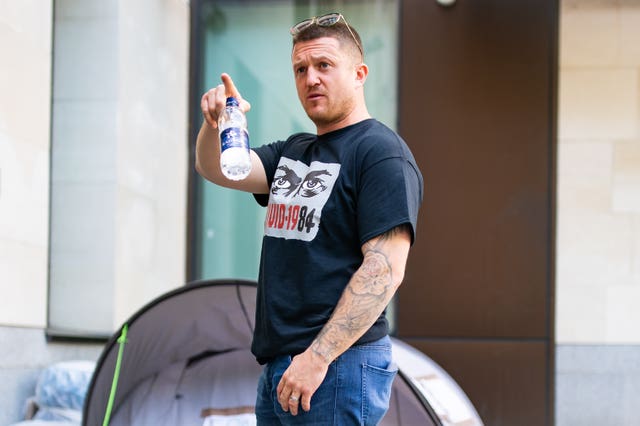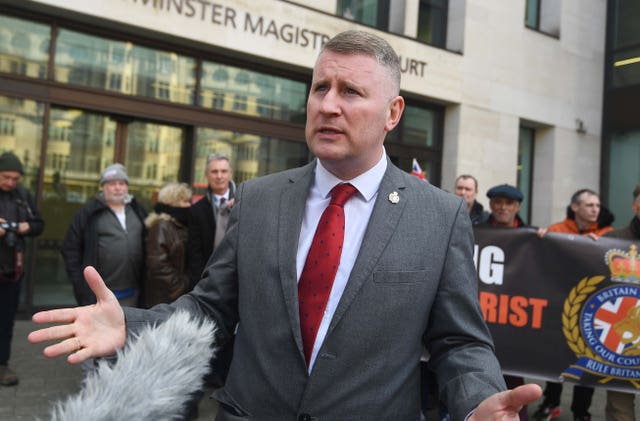Police ‘completely unjustified’ in using terror law, claims Britain First leader
Paul Golding was stopped at Heathrow Airport in October last year after a visit to Russia.

The leader of far-right political group Britain First has claimed police were “completely unjustified” in using terrorism legislation to ask for access to his mobile phone after he returned from a political trip to Russia.
Paul Golding, 38, was stopped by Metropolitan Police officers at Heathrow Airport in October last year on his way back from visiting the Russian parliament in Moscow.
He refused to give the pin codes for a phone, hard drive and laptop and was later charged with willingly refusing to comply with a duty under Schedule 7 of the Terrorism Act.
Golding has denied the charge and a trial was held before Chief Magistrate Emma Arbuthnot at Westminster Magistrates’ Court in London on Wednesday.
English Defence League founder Tommy Robinson, whose real name is Stephen Yaxley-Lennon, watched proceedings in the court’s socially distanced public gallery.

He said the legislation enables accredited officers to “speak to people in order to make a determination of whether they are or have been concerned in the commission, preparation or instigation of acts of terrorism”.
The officer said Schedule 7 allows police to interrogate, search and detain anyone for up to six hours at UK ports.
He said he had cause to examine Golding under the legislation and recalled him allegedly being initially “agitated” and “clearly angry” at being stopped, and shouting at officers.
Prosecutor Samuel Main told the court Golding was questioned for nearly three hours about his activities in Russia after flying out with two others on October 20.
The court heard that Golding claimed he was on a “purely political trip” after establishing friendships in Russia during a international congress on an earlier date.
He told officers he had returned to the country under the invitation of the Liberal Democratic Party of Russia (LDPR), which he described as a “right-wing, conservative, patriotic group” who were not “extreme”.

He said he had not met any representative of the Russian government, the court heard.
Golding, of Hodder Bank, Stockport, who appeared in the dock wearing a grey suit, white shirt and red tie, spoke only to confirm his name, date of birth, address and nationality.
Over the course of his three-day trip Golding gave interviews to the media, met members of the LDPR and visited the Russian parliament and LDPR’s headquarters, Mr Main said.
He also visited Moscow’s Red Square and laid a wreath at the tomb of the unknown soldier.
Asked about the policies, tactics, and influence of the LDPR, Mr Golding said policies covered the issues of terrorism, Islamic extremism, immigration and family values.
He said the party held 40 seats in the Russian parliament.
Golding, who was able to consult a lawyer at the time, said his party was a “patriotic, right-wing, conservative” group who considered themselves “loyalist”.
Clips of an audio recording of the police interview were played in court in which Golding could be heard saying the request for his pin codes was “wildly inappropriate”, “completely unjustified”, an “abuse of police powers” and a “political witch hunt”.
Golding added: “I don’t think think you have any grounds to suspect me of terrorism in any way shape or form.”
Representing Golding, Abigail Bright said Britain First had never been a banned organisation under the Terrorism Act.
Ms Bright said Golding had been “calm, compliant and respectful” during interview.
Britain First was deregistered as a political party in November 2017.





